模块3第1到3单元课文翻译兼句子解析精编版
模块三牛津高中英语课文翻译定稿版

模块三牛津高中英语课文翻译HUA system office room 【HUA16H-TTMS2A-HUAS8Q8-HUAH1688】牛津英语模块3译文Appendix I: TranslationUnit 1Reading雾比尔·洛浓雾警报那天早晨波莉离家时,整个城市已笼罩在灰色的薄雾中。
午餐时分,收音机预报说,薄雾将会在下午变成浓雾。
下午四点,波莉下了班,步入了浓雾中。
她不知道公交车是否还会照常运行。
没有到国王大街的巴士一走到街上,她就快步向平常乘车的公交车站走去。
“您要坐多远?”巴士售票员收下她的车费前问道。
“国王大街。
”波莉答道。
“对不起,小姐,”售票员回答说,“现实情况是雾太浓了,公交车跑不了那么远。
乘地铁到格林公园吧。
那里的天气可能好一点,您也许能叫到一辆出租车。
”高个子男人当波莉打量地铁车厢里的乘客时,她感到她正被一个穿着黑色大衣的高个子男人注视着。
地铁终于到达了格林公园站。
当其他乘客走出车厢时,她扫视了一下她周围的一张张面孔。
那个高个子男人不见了。
脚步声当波莉到达车站入口处时,那里空无一人。
外面,她目光所及之处,雾像浓密的灰云一样聚积着。
什么人也看不见。
波莉朝着公园大街走去。
当她沿着狭窄的街道行走时,她听到了由远及近的脚步声,但当她走到街道拐角处时,脚步声却消失了,突然,波莉感到有一只粗糙的手拂过她的脸颊'并且她还听到了一个男人在她耳边说“对不起”的声音。
那个男人走开了。
她能感到她的心脏因害怕而怦怦地直跳。
热心的陌生人然后,她又听到了那种声音——在她身后响起的轻柔的脚步声。
一分钟前,她曾希望有人跟着来。
现在她则想跑开,可恐惧让她挪不动脚步。
脚步声这会儿似乎很近了。
接着,一个男人的声音从黑暗中传来:“有人吗?”波莉犹豫了。
最终她还是回答道:“你好,我想我是迷路了。
”几秒钟后,一只手伸过来抓住了她的胳膊。
波莉抬头看去,发现是一位长着络腮胡子的老人。
“也许我能帮你。
M1U3U1英汉
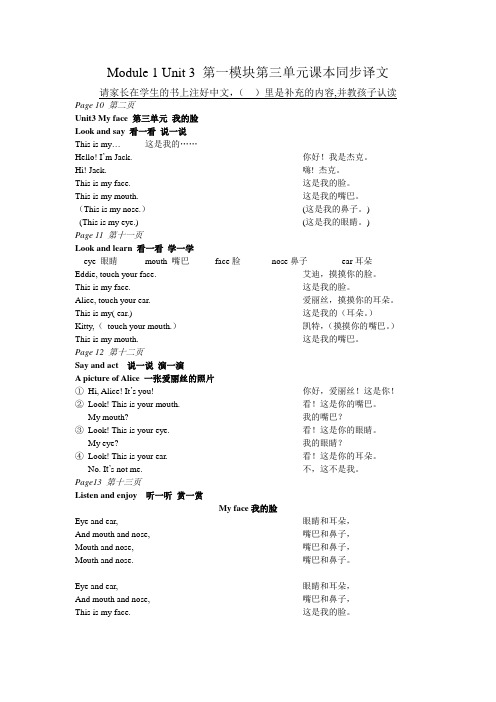
Module 1 Unit 3 第一模块第三单元课本同步译文请家长在学生的书上注好中文,()里是补充的内容,并教孩子认读Page 10 第二页Unit3 My face 第三单元我的脸Look and say 看一看说一说This is my…这是我的……Hello! I’m Jack. 你好!我是杰克。
Hi! Jack. 嗨! 杰克。
This is my face. 这是我的脸。
This is my mouth. 这是我的嘴巴。
(This is my nose.)(这是我的鼻子。
) (This is my eye.) (这是我的眼睛。
)Page 11 第十一页Look and learn 看一看学一学eye 眼睛mouth 嘴巴face脸nose鼻子ear耳朵Eddie, touch your face. 艾迪,摸摸你的脸。
This is my face. 这是我的脸。
Alice, touch your ear. 爱丽丝,摸摸你的耳朵。
This is my( ear.) 这是我的(耳朵。
)Kitty,(touch your mouth.)凯特,(摸摸你的嘴巴。
)This is my mouth. 这是我的嘴巴。
Page 12 第十二页Say and act 说一说演一演A picture of Alice 一张爱丽丝的照片①Hi, Alice! It’s you! 你好,爱丽丝!这是你!②Look! This is your mouth. 看!这是你的嘴巴。
My mouth? 我的嘴巴?③Look! This is your eye. 看!这是你的眼睛。
My eye? 我的眼睛?④Look! This is your ear. 看!这是你的耳朵。
No. I t’s not me. 不,这不是我。
Page13 第十三页Listen and enjoy 听一听赏一赏My face我的脸Eye and ear, 眼睛和耳朵,And mouth and nose, 嘴巴和鼻子,Mouth and nose, 嘴巴和鼻子,Mouth and nose. 嘴巴和鼻子。
牛津高中英语模块三三篇reading翻译
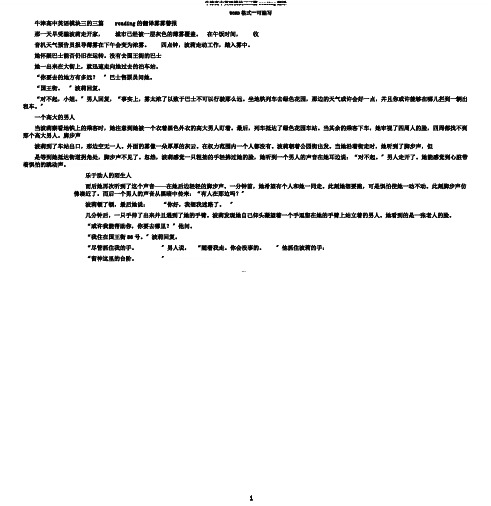
牛津高中英语模块三三篇reading翻译WORD格式--可编写牛津高中英语模块三的三篇reading的翻译雾雾警报那一天早受骗波莉走开家,城市已经被一层灰色的薄雾覆盖。
在午饭时间,收音机天气预告员报导薄雾在下午会变为浓雾。
四点钟,波莉走动工作,踏入雾中。
她怀疑巴士能否仍旧在运转。
没有去国王街的巴士她一出来在大街上,就迅速走向她过去的泊车站。
“你要去的地方有多远?〞巴士售票员问她。
“国王街。
〞波莉回复。
“对不起,小姐。
〞男人回复,“事实上,雾太浓了以致于巴士不可以行驶那么远。
坐地铁列车去绿色花园,那边的天气或许会好一点,并且你或许能够在哪儿拦到一辆出租车。
〞一个高大的男人当波莉察看地铁上的乘客时,她注意到她被一个衣着黑色外衣的高大男人盯着。
最后,列车抵达了绿色花园车站。
当其余的乘客下车,她审视了四周人的脸,四周都找不到那个高大男人。
脚步声波莉到了车站出口,那边空无一人。
外面的雾像一朵厚厚的灰云。
在权力范围内一个人都没有。
波莉朝着公园街出发。
当她沿着街走时,她听到了脚步声,但是等到她抵达街道拐角处,脚步声不见了。
忽然,波莉感觉一只粗拙的手轻拂过她的脸,她听到一个男人的声音在她耳边说:“对不起。
〞男人走开了。
她能感觉到心脏带着惧怕的跳动声。
乐于助人的陌生人而后她再次听到了这个声音——在她后边轻轻的脚步声。
一分钟前,她希望有个人和她一同走。
此刻她想要跑,可是惧怕使她一动不动。
此刻脚步声仿佛凑近了。
而后一个男人的声音从黑暗中传来:“有人在那边吗?〞波莉顿了顿,最后她说:“你好,我想我迷路了。
〞几分钟后,一只手伸了出来并且遇到了她的手臂。
波莉发现她自己仰头凝望着一个手逗留在她的手臂上站立着的男人。
她看到的是一张老人的脸。
“或许我能帮助你,你要去哪里?〞他问。
“我住在国王街86号。
〞波莉回复。
“尽管抓住我的手。
〞男人说,“随着我走。
你会没事的。
〞他抓住波莉的手:“留神这里的台阶。
〞---牛津高中英语模块三三篇reading翻译WORD格式--可编写在他的此外一只手上男人拿着一根手杖。
外研版初三上册英语课文翻译:Module3(1)

外研版初三上册英语课文翻译:Module3Module 3 Sporting lifeUnit 1 When will the match be held?玲玲:你好,托尼。
你看上去很累。
托尼:是的。
我正和BIG—北京国际环球者为学校的篮球赛训练。
那时下周的一个大赛。
贝蒂:和谁比赛?大明:HAS玲玲:HAS代表什么?托尼:代表海淀之星贝蒂:哦,是的。
上次你们被打败了。
玲玲:比分是多少?贝蒂:海淀之星和环球者的比分是98比52。
那么,比赛什么时候举行?大明:下周六,你来吗?贝蒂:是的。
那将是一场艰苦的比赛。
我打算为《新标准》写一篇报道。
玲玲:我同意。
大明,你参加比赛吗?大明:不参加,我这次没有被选上。
贝蒂,你为什么笑?贝蒂:哦,这个赛季我看过HAS大的几场比赛,他们太棒了!如果你想知道我的看法……托尼:不,我不……贝蒂:……你们没有机会了!玲玲,你认为呢?玲玲:我认为你是对的贝蒂。
大明:哦,如果你那么想,不允许你和我们的球迷一起看比赛!贝蒂:大明,那是事实。
托尼:哦,我不同意。
这个赛季我们打得确实很好。
我认为我们如此棒,以至于会被邀请去奥运会打比赛。
大明:不要让他们影响你,托尼!玲玲:嘿嘿,贝蒂,做得好!贝蒂:当然,他们如此生我们的气,以至于他们会努力去获胜,来证明我们错了。
Unit 2 Liu Xiang was trained for gold.刘翔——训练夺金 2004年体育年鉴对刘翔来说,作为体育英雄的生活刚刚开始。
首先,他将被邀请去世界各地参加比赛。
他将被推选代表中国参加奥运会。
他是中国国际体育成功的象征。
现在,因为刘翔已经世界闻名了,他还会被邀请做广告、拍电影、甚至录唱片。
但是,她的教练孙海平准确保他又规律地训练。
刘翔被教练建议如何成为一名优秀运动员,被经纪人建议如何成为明星。
刘翔并不是一夜成名。
他于1983年7月13日出生于上海,想很多奥林匹克体育明星一样,当他很小时就开始训练了。
在四年级的时候,他去了上海普陀区初级体校。
模块3第1到3单元课文翻译兼句子解析

模块3第1到3单元课文翻译兼句子解析第1单元课文翻译兼句子解析原文:What’s your favorite fruit?My favorite fruit is an apple.译文:你最喜欢的水果是什么?我最喜欢的水果是苹果。
句子解析:•What’s your favorite fruit?(你最喜欢的水果是什么?)–what’s:what is的缩略形式,意为“什么”,引导一个疑问句。
–your:你的。
–favorite:最喜欢的。
–fruit:水果。
•My favorite fruit is an apple.(我最喜欢的水果是苹果。
)–My:我的。
–favorite:最喜欢的。
–fruit:水果。
–is:是。
–an:一(不定冠词,用于泛指)。
–apple:苹果。
第2单元课文翻译兼句子解析原文:Good morning.Good morning. How are you today?Fine, thank you. And you?I’m fine. Thanks for asking.译文:早上好。
早上好。
你今天怎么样?很好,谢谢,你呢?我也很好,谢谢关心。
句子解析:•Good morning.(早上好。
)–Good:好的。
–morning:早上。
•Good morning. How are you today?(早上好。
你今天怎么样?)–How:怎么样。
–are:是。
–you:你。
–today:今天。
•Fine, thank you. And you?(很好,谢谢,你呢?)–Fine:很好。
–thank you:谢谢你。
–And:还有。
•I’m fine. Thanks for asking.(我也很好,谢谢关心。
)–I’m:我是。
–fine:很好。
–thanks:谢谢。
–for:为了。
–asking:问候。
第3单元课文翻译兼句子解析原文:Hi, my name is John. What’s your name?My name is Alice. Nice to meet you, John.Nice to meet you too, Alice.译文:嗨,我叫约翰。
模块3第1到3单元课文翻译兼句子解析

陈才英语教育及培训中心2014年广东佛山初中2年级上册课本对应语法精品讲解【外研社八年级英语上册模块1精品讲解】主讲老师:辅导学生:【日期:2014年7月25日】【一】【模块3的第1单元对话讲解/中英文注解】Module 3 Sports【模块3 体育运动】Module task: Making a sports poster 制作一份体育运动海报Unit 1 Nothing is more enjoyable than playing tennis第1单元,没有事情是比打网球更加令人愉快的Daming: Hey, Tony. 【Come and watch过来并观看】【the football match这场足球比赛】【on TV!在电视上】【句子结构,祈使句:两个并列动词+宾语+地点状语】【come and watch =come to watch】中文翻译:大明:嗨/嘿,托尼,过来在电视上看这场足球比赛. Tony: Ok. What’s the score?【名词得分;比分;进球数】中文翻译:托尼:好的.这个比赛得分/比分是多少?Daming: Spain scored 【a minute ago一分钟之前】.【动词(比赛中)得(分),进(球)】中文翻译:大明:西班牙一分钟前刚得分了.Tony: Wo w! That’s fast!中文翻译:托尼:哇噻,那真是太快了!Daming: 【That’s right!那是对的】【Last week 上个星期】【the match 那场比赛】【on TV 电视上的】【was 是】【so boring如此的无聊/乏味】【because 因为】【no one没有一个人】【scored得分】【at all 根本】. 【So 因此】【this week’s match这个周的比赛】【is already 已经是】【more exciting.更加令人兴奋的;令人激动的;刺激的】中文翻译:大明:那是对的,上个星期电视上这场比赛非常乏味,因为根本没有一方得分/进球了,因此这个周的比赛已经更加刺激/令人兴奋.Betty: What’s the matter with you, Tony? You look tired.中文翻译:贝蒂:托尼,你怎么了?你看上去感觉很疲劳.Tony: I’m really tired after last night’s tennis match. And I hurt my knee.中文翻译:托尼:昨天晚上看完网球比赛后我感觉非常累,我伤到了我的膝盖.Daming: That’s too bad! Sit down and watch the match. It’s safer than playing tennis.中文翻译:大明:那真太槽糕了,坐下来观看这场比赛,这/它比打网球更加安全.Betty: Yes, watching is not dangerous and it’s more relaxing too!中文翻译:贝蒂:是的,观看不危险,并且它也是更加令人放松. Tony: Well, I’m not sur e about that. Nothing is more enjoyable than playing tennis.中文翻译:托尼,好吧,我不确信是那样,没有事情是比打网球更加令人愉快的.Betty: But you enjoyed watching the Olympics on TV, right?中文翻译:贝蒂:但是你喜欢在电视上观看奥林匹克运动会,对吗?Tony: Yes, but that’s because it was cheaper than buying tickets for all the games.中文翻译:托尼:是的,但是那是因为在电视上观看要比购买所有的比赛的门票更加便宜.Daming: And staying at home was easier than going to the stadium. Oh, look at that!中文翻译:大明:而且呆在家里要比去体育馆更加容易,哦,看那个. Tony: Oh, he missed! Oh, bad luck!中文翻译:托尼:哦,他错过了这次进球,哦,真是坏运气!Daming: Never mind. There’s still plenty of time for them to score.中文翻译:大明:没有关系/不要紧,他们仍然还有大量/充分得分/进球的时间.Unit 2 This year we are training more carefully.第2单元,今年我们正更加仔细的训练.①It is Saturday tomorrow, but I am going to school. I am not going for lessons, but to play football.②I am in our school team and we are going to play against another school next week.③The practice starts at 10 am.④We all arrive as early as we can so that we have time to warm up.⑤We are training harder than usual because theother team beat us last year.⑥This year we want to do better.中文翻译:明天是星期六,但是我还是要上学,我不是为了上课,而是为了踢足球,我在我们学校队,下个星期我们将要和另外学校进行比赛,这个训练将在上午10点开始,我们都要尽早地达到以便于我们有进行热身运动的时间,我们要比平时训练更加努力/刻苦,因为其他队去年战胜了/打败了我们,今天我们想做的更好点.⑦It is more difficult to practice in winter because the days are short and the weather is cold too.⑧It gets dark earlier, so it is important not to be late for after-school practice.中文翻译:在冬天训练更加困难了,因为白天短了,天气也很寒冷,而且天黑得更早了,因此课外训练不要迟到是很重要的our coach is pleased because we are playing better as a team now. Last year we were sometimes careless when we passed the ball and we lost to the other team in the final match. What a pity! This year we are training more carefully. That means we have a better chance of winning.中文翻译:因为我们现在作为一个球队打的更好些,因此我们的教练对此感到很满意,去年,当我们在传递球的时候我们有时候非常粗心,并在最后决赛的时候输给了其他队,多么可惜啊!今天我们训练更加仔细,那意味着我们有一个更大获胜的机会.The fan club has fewer people this year. We hope to play well so that we have more fans to watch the matches. It is good to have our fans around. They cheer us on loudly and we feel more confident to win thegame.中文翻译:今年足球迷俱乐部的人数更少了,我们希望打得好一点以便于我们有更多足球迷来观看这些比赛,到处拥有足球迷是有好处的,他们大声地为我们呐喊/欢呼/助威,我们会更有信心去赢得这场比赛.重点,难点句子讲解【1】It is Saturday tomorrow, but I am going to school. I am not going for lessons, but to play football.该句子为一个省略句:省略了【主语+谓语】部分为:全句子应该为but( I am going) to play football=但是我将要踢足球.①It is Saturday tomorrow.【主语+系动词+表语+时间状语】句子语法结构如下:主语:It(指代时间)系动词:is (是)表语:Saturday(星期六)时间状语:tomorrow(明天)时态:一般现在时态句子中文意思:明天是星期六.②but I am going to school. 【连词+主语+谓语+状语】句子语法结构如下:连词:but (但是)主语:I(我)谓语:am going(将要去)状语:to school(学校)时态:现在进行时态句子中文意思:但是我将要去学校.③I am not going for lessons, but to play football.并列分句⑴:I am not going for lessons转折连词:but并列分词⑵:but (I am going省略了) to play football 并列分句⑴结构:【主语+谓语+状语】并列分句⑴句子语法结构如下:主语:I(我)谓语:not am going(将要去)状语:for lessons(上课)句子时态:现在进行时态句子意思:我将不是去上课.并列分句⑵结构:【主语+谓语+状语】并列分句⑵句子语法结构如下:转折连词:but(但是)主语:I(我)(省略)谓语:am going(将要去)(省略)状语:to play football(去踢球)句子时态:一般将来时态句子中文意思:而是我将要去踢足球.【二】I am in our school team and we are going to play against another school next week.【该句为一个并列句】句子语法结构如下:【简单句⑴+并列连词+简单句⑵】简单句⑴【主语+系动词+表语】主语:I (我)系动词:am(是)表语:in our school team(在我们学校队)时态:一般现在时态句子意思:我在我们学校足球队.简单句⑵【主语+谓语+目的状语】主语:we (我们)谓语: are going(将要)目的状语:to play against another school(与另外一所学校进行比赛)时间状语:next week.(下个周)【短语动词play against与... 比赛】时态:一般将来时态句子意思:我们将在下个周与另外一所学校进行足球比赛.【三】T he practice starts at 10 am.句子结构:【主语+谓语+状语】句子语法结构如下:主语:The practice (这个训练)谓语: starts(将开始)时间状语:at 10 am(在上午10点钟)句子时态:一般现在时态句子中文意思:这个训练将在上午10点钟开始.【四】We all arrive as early as we can so that we have time to warm up.【复合句】复合句结构:主句⑴+从属连词+从句⑵主句⑴:We all arrive as early as we can(arrive)从属连词:so that(以便于)从句⑵we have time to warm up.(我们有做准备活动的时间)从句⑴结构:【主语+同位语+谓语+状语】主句⑴句子语法结构如下:主语:We (我们)同位语: all(都)谓语: arrive(抵达,到达)状语:as early as we can(我们尽可能早地到达)句子时态:一般现在时态中文翻译:我们都将尽可能早地到达.从属连词:so that(以便于)从句⑵we have time to warm up.从句⑵结构:【连词+主语+谓语+宾语+定语】主句⑵句子语法结构如下:主语:We(我们)谓语:have(有)宾语:time(时间)后置定语:to warm up(做准备活动,热身运动)句子时态:一般现在时态句子中文意思:我们有做热身运动(准备活动)的时间.整个复合句的意思:我们都尽可能早地到达以便于我们有做热身运动(准备活动)的时间.【五】We are training harder than usual because the other team beat us last year.句子结构:主句⑴+连词+从句⑵从句⑴结构:【主语+谓语+状语】主句⑴语法结构如下:主语:We (我们)谓语:are training (训练)比较状语:harder than usual(比平常更加努力/刻苦)句子时态:现在进行时态(属于阶段进行时态)句子中文意思:我们要比平常训练更刻苦/努力.从句⑵结构:【连词+主语+谓语+宾语+状语】主句⑵语法结构如下:从属连词:because(因为)主语:the other team(其它队)谓语:beat(打败,击败战胜)宾语:us (我们)时间状语:last year(去年)句子时态:一般过去时态中文翻译:因为去年其它队打败(战胜)了我们.【六】This year we want to do better.句子结构为:【主语+谓语+宾语】句子语法结构如下:时间状语: this year (今年)主语:We (我们)谓语: wants(想)宾语:to do better (做的更好点)时态:一般现在时态句子中文意思:今天我们想做的更好点.【七】It is more difficult to practice in winter because the days are short and the weather is cold too.句子结构:主句⑴+连词+从句⑵从句⑴结构:【主语+系动词+表语】主句⑴语法结构如下:主语:It (它)系动词:is(是)表语:more difficult(更加困难)句子真正主语:to practise in winter( 在冬天训练)句子时态:一般现在时态句子中文意思:在冬天训练是更加困难的从句⑵结构:【连词+主语+系动词+表语】主句⑵语法结构如下:从属连词:because(因为)并列分句⑴语法结构主语:the days(白天)系动词:are(是)表语: short(短的)句子时态:一般现在时态中文翻译:因为白天变短了.并列分句⑵语法结构主语:the weather(白天)系动词:is(是)表语: cold(寒冷的)句子时态:一般现在时态中文翻译:天气也很寒冷从句完整翻译:因为白天变短了并且天气很寒冷了.【八】It gets dark earlier, so it is important not to be late for after-school practice.句子结构:(表原因)并列句⑴+连词并列句⑵并列句⑴语法结构【主语+系动词+表语+状语】主语:It(它)系动词:gets(变得)表语:dark(黑暗)状语:earlier(更早地)时态:一般现在时态句子中文意思:天更早就变黑了.并列句⑵语法结构【主语+系动词+表语+状语】形式主语:It (它)系动词:is(是)表语:important(重要的)正真主语:not to be late for after-school practice(课后训练不迟到)时态:一般现在时态句子中文意思:课后训练不迟到是很重要的.【九】our coach is pleased because we are playing better as a team now. 句子结构:主句⑴+连词+从句⑵从句⑴结构:【主语+系动词+表语】主句⑴语法结构如下:主语:Our coach (我们的教练)系动词:is(是)表语:pleased(满意的,高兴的)句子时态:一般现在时态句子中文意思:我们的教练很满意.从句⑵结构:【连词+主语+系动词+表语】主句⑵语法结构如下:从属连词:because(因为)主语:We(我们)谓语:are playing(踢得)状语: better(更好地)状语:as a team (作为一个足球队)状语:now(现在)句子时态:一般现在时态中文翻译:因为我们现在作为一个足球队踢得更好了.完整中文翻译:因为我们现在作为一个足球队踢得更好了.所以我们教练很满意/很高兴.【十】Last year we were sometimes careless when we passed the ball and we lost to the other team in the final match.句子结构:主句⑴+连词+从句⑵主句⑴的结构:【主语+系动词+状语+表语】主句⑴并列举分句⑴的语法结构主语:We(我们)系动词:were(是)状语:sometimes(有时候)表语:careless (粗心的,疏忽的)时态:一般现在时态句子中文意思:我们有时候很粗心.主句⑴并列分句⑵的语法结构【并列连词+主语+谓语+宾语】连词:and (并,然后)主语:we(我们)谓语: lost to (输给)宾语:the other team (其它队)状语:in the final match. (在决赛中)从句⑵结构:【主语+谓语+宾语】从句⑵语法结构如下:时间状语:last year (去年)引导时间状语从属连词:when(当….的时候)主语:we (我们)谓语:passed (传递)宾语:the ball(球)句子时态:一般现在时态句子中文意思:去年当我们在传递球的时候.整个复合句中文意思:去年当我们在传递球的时候.我们有时候很粗心,并输给了其它球队.【十一】What a pity!句子种类感叹句句子结构:what + 冠词+名词(主语)+(谓语)What a pity (it is) !句子时态:一般现在时态句子中文意思:多么可惜啊!多么遗憾啊!【十二】This year we are training more carefully.句子种类:肯定陈述句句子结构:时间状语+主语+谓语+状语句子语法结构:时间状语:this year(今年)主语:we(我们)谓语:are training(训练)状语:more carefully(更加仔细地)时态:现在进行时态(属于阶段进行时态)句子中文意思:今年,我们要更加仔细训练.【十三】That means we have a better chance of winning.句子种类:肯定陈述句句子结构:主语+谓语+宾语从句主句的语法结构:主句主语:That (那)主句谓语:means(意味着)主句宾语:we have a better chance of winning(我们有一个更大的获胜机会)宾语从句的语法结构:主语:We(我们)谓语:have(有)宾语:a better chance(一个更大的机会)后置定语:of winning(获胜的)时态:一般现在时态句子中文意思:那意味着我们拥有一个更大的获胜的机会.【十四】The fan club has fewer people this year.句子种类:肯定陈述句句子结构:主语+谓语+宾语+时间状语句子的语法结构:主语:The fan club(球迷俱乐部)谓语:has (有)宾语:fewer people(更少的人)时间状语:this year(今年)时态:一般现在时态句子中文意思:球迷俱乐部今年人数更少了.【十五】We hope to play well so that we have more fans to watch the matches.句子结构:主语+谓语+连词+目的状语从句句子的语法结构:主语:We (我们)谓语:hope(希望)宾语:to play(踢球)状语:well(好地,很好地)时态:以便现在时态:句子中文意思:我们希望踢好点.目的状语从句so that we have more fans to watch the matches.连词:so that (以便于)从句主语:we (我们)从句谓语:have(有)从句宾语:more fans(更多球迷)从句定语:to watch the matches(观看这些比赛)时态:一般现在时态句子中文意思:以便我们有更多球迷观看这些比赛.【十六】It is good to have our fans around. 【动词不定式作句子主语】句子种类:肯定陈述句句子结构:主语+系动词+表语句子的语法结构:形式主语:It(它)系动词:is (是)表语:good(有好处的,有益处的)真正主语:to have our fans(拥有我们的球迷)状语:around(到处,四周,周围)【十七】They cheer us on loudly and we feel more confident to winthe game.句子种类:肯定陈述句句子结构:并列分句⑴+ 连词(and)+并列分句⑵并列分句⑴的语法结构:主语:They(他们)谓语:cheer on(为…欢呼,喝彩,加油)宾语:us(我们)状语:loudly(大声地)时态:一般现在时态:句子中文意思:他们为我们大声地欢呼.并列分句⑵连词:and(然后,而且,并)主语:we(我们)系动词:feel(感觉;觉得)表语:more confident(更加有信心)状语:to win the game (去赢得这场比赛)时态:一般现在时态句子中文意思:我们感觉更加有信心去赢得这场比赛.。
(2021年整理)牛津高中英语模块三第一单元知识点整理及单元练习(解析版)

牛津高中英语模块三第一单元知识点整理及单元练习(解析版)编辑整理:尊敬的读者朋友们:这里是精品文档编辑中心,本文档内容是由我和我的同事精心编辑整理后发布的,发布之前我们对文中内容进行仔细校对,但是难免会有疏漏的地方,但是任然希望(牛津高中英语模块三第一单元知识点整理及单元练习(解析版))的内容能够给您的工作和学习带来便利。
同时也真诚的希望收到您的建议和反馈,这将是我们进步的源泉,前进的动力。
本文可编辑可修改,如果觉得对您有帮助请收藏以便随时查阅,最后祝您生活愉快业绩进步,以下为牛津高中英语模块三第一单元知识点整理及单元练习(解析版)的全部内容。
新牛津高中英语模块三第一单元知识点整理及单元练习M3 UNIT 1一.词汇大集合1、单词Rare(ad。
)——--rarely fog(a.)-—-—foggy truth(a.)—--trueFirmly(a.)——- firm freeze(a。
)--—freezing distance (a。
)——-distantDarkness(a。
)———dark change(a.)——-changeable deadly (n。
)—-— deathDeeply(n。
)—--depth treatment(v.)-—-treat volunteer(v。
)——-volunteerDeserted(v。
)——- desert stressed(v./ n.)--—stress; stress data(单数)—---datumSweat(形似词)——-sweet drown(形似词)—--drawn reduce(反义词)---increaseAccept(反义词)---refuse latter(反义词)—-—former impossible(反义词)-——possibleFear(反义词)—--fearlessness likely(反义词)——-unlikely unpleasant(反义词)———pleasantNowhere(反义词)--——everywhere sniff(近义词)———smell observe(近义词)---watchMethod (近义词)---way tip(近义词)-—-advice chance(近义词)--—possibilityRough(反义词)———smooth ignore(近义词组)-—-pay no attention toBeat(过去式,过去分词)————beat; beaten stick(过去式,过去分词)---—stuck;stuckFly(过去式,过去分词)--- flew; flown tap(过去式,过去分词)—-- tapped, tapped Panic(过去式,过去分词,现在分词)——-panicked; panicked; panicking二。
外研版九年级上册英语Module3Unit1部分课文翻译
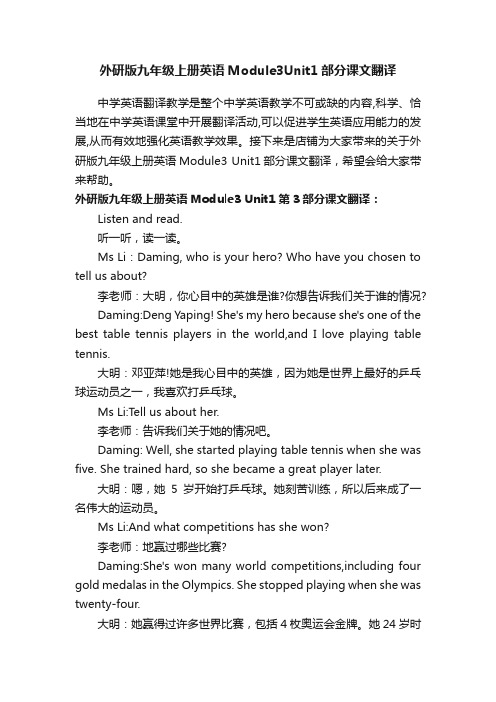
外研版九年级上册英语Module3Unit1部分课文翻译中学英语翻译教学是整个中学英语教学不可或缺的内容,科学、恰当地在中学英语课堂中开展翻译活动,可以促进学生英语应用能力的发展,从而有效地强化英语教学效果。
接下来是店铺为大家带来的关于外研版九年级上册英语Module3 Unit1部分课文翻译,希望会给大家带来帮助。
外研版九年级上册英语Module3 Unit1 第3部分课文翻译:Listen and read.听一听,读一读。
Ms Li:Daming, who is your hero? Who have you chosen to tell us about?李老师:大明,你心目中的英雄是谁?你想告诉我们关于谁的情况?Daming:Deng Yaping! She's my hero because she's one of the best table tennis players in the world,and I love playing table tennis.大明:邓亚萍!她是我心目中的英雄,因为她是世界上最好的乒乓球运动员之一,我喜欢打乒乓球。
Ms Li:Tell us about her.李老师:告诉我们关于她的情况吧。
Daming: Well, she started playing table tennis when she was five. She trained hard, so she became a great player later.大明:嗯,她5岁开始打乒乓球。
她刻苦训练,所以后来成了一名伟大的运动员。
Ms Li:And what competitions has she won?李老师:地赢过哪些比赛?Daming:She's won many world competitions,including four gold medalas in the Olympics. She stopped playing when she was twenty-four.大明:她赢得过许多世界比赛,包括4枚奥运会金牌。
(完整word版)牛津高中英语模块3课文对照翻译百度上传(2)

Unit 1FogFog warningWhen Polly left home that morning, the city was already covered in a grey mist. At lunch, the radio forecast that the mist would become a thick fog in the afternoon. At four o'clock, Polly left work and stepped out into the fog .She wondered if the buses would still be running.No buses to King StreetOnce out in the street, she walked quickly towards her usual bus stop.‘How far are you going?’ the bus conductor asked her before he took her fare.‘King Street.’ said Polly.‘Sorry,Miss’replied the man, ‘the truth is that it is too foggy for the bus to run that far. Take the Underground to Green Park. The weather might be better there and you might be able to get a taxi.’A tall manAs Polly observed the passengers on the train, she had a feeling that she was being watched by a tall man in a dark overcoat. At last the train arrived at Green Park station. While the rest of the passengers were getting out, she glanced at the faces around her. The tall man was nowhere to be soon.FootstepsWhen Polly got to the station entrance, it was empty. Outside, wherever she looked the fog lay like a thick, grey cloud. There was no one in sight. Polly set off towards Park Street. As she heard a man’s voice in her ear saying ‘Sorry.’ The man move d away. She could feel her heart beating with fear.The helpful strangerThen she heard the sound again-soft footsteps behind her. A minute before, she had wished for someone to come along. Now she wanted to run, but fear held her still. The footsteps seemed close now. Then a man’s voice came out of the darkness. ‘Is anybody there?’Polly hesitated. At last she answered, ‘Hello, I think I’m lost. ’A few seconds later, a hand reached out and grasped her arm. Polly found herself staring up at the face of an old man with a beard.‘Maybe I can help you. Which road do you want?’ he asked.‘I live at 86 King Street.’ Polly replied.‘Just take my hand.’ said the man. ‘Come with me. You’ll be all right.’ He took Polly’s hand. ‘Watch out for the step here.’In his other hand the man carried a stick. Polly heard it hit the step. ‘I can remember some terrible fogs, but maybe that was before your time. I can’t see your face, but you sound young. How old are you?’‘Just twenty.’ answered Polly.‘Ah, twenty ! A nice age to be. I was young once. Now we’re at the crossroads. Turn left here.’‘I’m quite lost now. Are you sure you know the way?’ Polly was beginning to feel frightened again.’‘Of course. You really shouldn’t feel anxious,’ He held her hand more firmly.The grateful helper‘Here we are. King Street.’ He stopped.‘Thank you so much for coming to my aid.’ said Polly in relief. ‘Would you like to come in and rest for a while?’‘It’s very nice of you.’ said the man, ‘but I’ll be off. There may be more people lost today, and I’d like to help them. You see, a fog this bad is rare. It gives me the chance to pay back the help that people give me when it’s sunny. A blind person like me can’t get across the road without help, except in a fog like this.’P18ProjectShark attacksThere are nearly 400 different types of sharks, but only about 30 types are known to have attacked human beings. Many people know that the most dangerous shark is the great white shark, probably because they have seen the film Jaws. However, two other sharks are also rather dangerous: the tiger shark and the bull shark. Contrary to what many people might assume, evidence shows that sharks seldom attack humans. There are three types of sharkattacks. In the main type, the shark attacks you because it mistakes you for a fish, but when it tastes human flesh it decides to give up and swims away. In the second type, the shark pushes you with its nose to find out if you are fit to be eaten, and then bites you if it thinks you are. In the third type, the shark waits for you to swim by, and then attacks you suddenly. The last two types of attack more often result in the death of humans.To reduce the risk of a shark attack, you should follow these suggestions.Do not swim in the dark. Sharks can still see you but you cannot see them.Do not go swimming in the ocean if you have a fresh wound. Sharks can smell blood over a long distance.Do not wear bright clothing or jewellery, because sharks are attracted to the flash of, colours and bright objects. Stay in groups, as sharks usually avoid large numbers of people.Recently, shark attacks have been increasing as water sports are becoming more popular. If a shark attacks you, follow the advice below.Keep calm. Do not panic.Hit the shark on the nose with your fist.Stick your finger in the shark's eye.Don't be frightened by sharks: youare 3o times more likely to be hit by lightning than be attacked by a shark.The wonderful world of pigeonsIt is night. All is quiet. The soldiers are asleep while a guard watches for theenemy. There is a flash, and the sound of guns! They are being attacked!Hundreds of enemy soldiers rush towards them. They are all going to bekilled unless they get help. What should they do?An officer writes a short message quickly on a small piece of paper: 'Beingattacked! Hurry!'He rolls up the paper and puts it into a small case, and then reaches into acage and gets a bird. Attaching the message to its leg, he sets the bird loose. Itimmediately flies into the air and disappears in the dark.Will the bird arrive in time? Will they be saved?Though it may seem hard to believe, the bird the officer uses is the same birdoften seen in public parks--the pigeon. Pigeons have a wonderful sense ofdirection and can find their way home over long distances. Indeed, pigeonshave been known to fly home from as far away as 1,800 kilometres. That iswhy pigeons have been used since ancient times to carry the news or eventhe mail. However, it was in war that they found their greatest use. Duringboth World War I and II, pigeons were employed by armies to carry messagesto and from the front lines, saving the lives of many soldiers and evenhelping win some important victories.How do pigeons find their way? Pigeons appear to have a compass insidethem that tells them which way is north. How this compass works remains amystery. Of course, since a compass alone is not enough to find one's way,they also appear to use their sight and even their sense of smell to tell themwhich way they should go. Unlike humans, they never get lost and canalways find their way home.Unit 2English and its historyAll through history, people from many different countries and cultures have lived together in Britain. The English language is made up of the grammar and vocabulary these people brought to Britain. That is why English has so many difficult rules that confuse people.Old EnglishOld English is very different from the English we speak nowadays. In fact, we would not be able to understand it if we heard it today. Before the 5th century, people in Britain all spoke a language called Celtic. Then two Germanic groups from the European mainland—the Angles and the Saxons—occupied Britain. Old English consisted of a mixture of their languages. (Both the English language and the English people are named after the Angles; the word Angle was spelt Engle in Old English.) Aside from place names such as London, very few Celtic words became part of Old English. At the end of the 9th century, the Vikings, people from Northern European countries such as Denmark and Norway, began to move to Britain. They brought with them their languages, which also mixed with Old English. By the 10th century, Old English had become the official language of England.When we speak English today, we sometimes feel puzzled about which words or phrases to use. This is because English has many words and phrases from different languages, but with similar meanings. For example, the word sick came from a word once used by the Angles and the Saxons, while ill came from a word once used by the Norwegians.Middle EnglishMiddle English is the name given to the English used from around the 12th to the 15th centuries. Many things played a part in the development of this new type of English. The most important contribution was from the Normans, a French-speaking people who defeated England and took control of the country in 1066. However, the Norman Conquest did not affect English as mush as the Angles and the Saxons’ victory about 600 years earlier, which led to Old English replacing Celtic. Even though the Normans spoke French for the entire 250 years they ruled England, French did not replace English as the first language. On the other hand, the English language did borrow many words from French. This resulted in even more words with similar meanings, such as answer (from Old English) and reply (from Old French). It is interesting to learn how the words for most animals raised for food, such as cow, sheep and pig, came from Old English. However, the words for the meat of these animals, which was served to the Normans, came from Old French: beef, mutton, pork and bacon.Old French made other contributions to Middle English as well. In Old English, the Germanic way of making words plural was used. For example, they said housen instead of houses, and shoen instead of shoes. After the Normans took control, they began using the French way of making plurals, adding an -s to house and shoe. Only a few words kept their Germanic plural forms, such as man/men and child/children.After the Norman Conquest, high-class people spoke French while common people spoke English. However, by the latter half of the 14th century, English had come into widespread use among all classes in England. In 1399, Henry Ⅳbecame King of England. His mother tongue was English, and he used English for all official events.Modern EnglishModern English appeared during the Renaissance in the 16th century. Because of this Modern English includes many Latin and Greek words. Pronunciation also went through huge changes during this period. Of course, this was not the end of the changes in the English language. The question of whether English will keep on changing in the future is easy to answer. It is certain that this process will continue, and people will keep inventing new words and new ways of saying things.ProjectThe development Chinese charactersThe Chinese language differs from Western languages in that, instead of an alphabet, ituses characters which stand for ideas, objects or deeds. Chinese words are formed byputting together different characters. In many cases, a single character can also make up aword. The history of the Chinese language can be examined by looking athow these characters developed.Chinese writing began thousands of years ago. According to an ancientstory, a man named Cang Jie invented Chinese writing. One winter daywhile he was hunting, he saw the tracks of animals in the snow andobserved that the appearance of each one was different. Then he had theidea that he could use different shapes to represent different objects. Thefirst Chinese characters were drawings of physical objects. Some charactershave been simplified and others have been made more difficult over time.However, as a whole, the characters have developed from drawings intostandard forms. The character for a mountain was at first three mountaintops together.This became one mountaintop and three lines, and over time turned into the characterused nowadays.Not all characters were developed from drawings of objects. Sometimes to express ideas,some characters were made by combining two or more characters together. For example,'rest' was made up of the characters for a man and a tree. The character 'prisoner' wasformed with a 'man' inside a square. Other characters were developed for directions and numbers. It is easy to distinguish their meanings by looking at them, for example, the characters for 'up' and 'down', which are opposites of each other.Though these kinds of characters indicate meanings, one of their shortcomings is thatthey do not show how they should be pronounced. Therefore, a method was developedto have one part of a character indicate the meaning and the other suggest thepronunciation. Many Chinese characters used today were made this way.In the 1950s the Chinese government introduced simplified Chinese characters and nowthey have widespread use in China's mainland.The story of BrailleUsually, when we talk about reading, we think of using our eyes to see letters written in ink on paper. However, this is not always true. For example, blind people cannot see, but they can still read books.The man who introduced blind people to reading was Louis Braille (1809-1852). Braille lost his eyesight at the age of three as a result of an injury. When he was ten, he went to a school for the blind in Paris. In those days, books for blind people used paper pressed against metal wire to form letters. Since the metal wire was heavy, each book weighed as much as 100 pounds. The whole system was not convenient for use. Indeed, the school library only had fourteen such books in it. In 1821, a soldier visited the school and showed the students a system for passing messages at night during times of battle. His system used paper with small, raised dots that could be felt with the fingers. Each letter of the alphabet was represented by a different pattern which consisted of twelve dots. The soldiers would drag their fingers over the raised dots to read the message. While the students found the soldier's idea interesting, the system was too difficult to be of practical use. However, young Louis Braille took the idea and worked on it. At the age of fifteen, he created a system with patterns of six raised dots representing each letter. 'Braille', the system for reading used today by blind people around the world, was thus born.The blind can easily recognize Braille with the fingers. They can also easily write in Braille with a special typewriter. Today, it is the most common system used by blind people for reading and writing, and nearly every language, including Chinese, has its own version of Braille for its people to use.Unit 3Lost civilizationsDay 1,15 JulyI feel lucky to have won a place on this trip. We are in Italy now, and tomorrow we are visiting Pompeii. Next week we are flying to China, and going to Loulan, which is known as China’s Pompeii in the desert. Both Pompeii and Loulan became lost civilizations long ago.Day 2,16 JulyThis morning we attended a lecture about Pompeii. The city was founded in the 8th century BC. In 89 BC, the Romans took over Pompeii. It then became a rich and busy city. Near the city was a volcano. On 24th August AD 79, the volcano erupted and lava, ash and rocks poured out of it onto the surrounding countryside. It continued to erupt for the next two days. Many people were buried alive, and so was the city. How unfortunate!Day 3,17 JulyToday I saw the ancient Roman city of Pompeii as it was 2,000 years ago. How amazing! The city was forgotten for many years until the 18th century when a farmer discovered a stone with writing on it. People started to dig in the area for treasure, which caused much damage. Thus, in 1860, the area was put under government protection so it could be preserved and studied.When I walked around the city, I saw streets just as they had been, with stepping stones along the road so you did not have to step in the mud on rainy days! I saw several houses which were decorated with wall paintings. I also saw the people who had been buried alive. It turns out that after the ash covered the people who failed to feel the city, their bodies nearly completely broke down and disappeared, leaving empty spaces to produce true-to-life figures of the people who had died in the disaster. You can see them today in Pompeii , in the same place where the people feel. The volcano is still there, but looks very quiet now. It’s hard to imagine how this peaceful volcano destroyed the whole city!Day10,24 JulyFinally, we arrived in Loulan after several days of travelling. This commercial city was busy and wealthy about 2,000 years ago. It was a stopping point on the famous Silk Road between the East and the west. It is believed to have been gradually covered over by sandstorms from AD200 to AD400. I am so excited to be here!Day11,25 JulyAn scholar from the local cultural institute, Professor Zhang, told us that around the year 1900 the European explorer Sven Hedin discovered the ruins of the Loulan Kingdom. Seven found the remains of buildings buried beneath the sand, together with a lot of treasures, including coins, painted pots, materials such as silk, documents and wall paintings. When we went to the city, we saw the city walls, palaces, temples, workshops and towers. We found the ruins most interesting. There was an ancient water system that ran through the middle of the city. The desert was once a green land with huge trees, but they were cut down and that resulted in the city from being buried by sand—what a pity!ProjectAncient Greek statue found in XinjiangResearchers announced the discovery of a small statue in northern Xinjiang, China, recently. The metal statue is of a Greek soldier. When asked how a statue from distant Greece could have appeared in China, researchers explained that no doubt this was a result of Alexander the Great’s influence.Alexander the Great (356-323 BC) was the son of a Greek king who defeated many Greek cities in battle. At the age of twenty, Alexander himself became king after his father died. However, many cities rose up against Alexander, so he led an army to take them back. Though his army had only 3,000 troops, he won every battle and many enemy soldiers joined him.In 334 BC, he took his army, now with 42,000 men, into the Middle East and then Egypt, defeating every army that stood in his path. Then he turned his eyes east, and marched all the way to India, finding victory wherever he went. It seemed that nothing could stop him from taking control of the entire world. However, his own army grew tired of endless battles and refused to go any further, so he had to turn back. By the age of thirty, he had already occupied more land than anyone before, and it seemed that more glory was waiting ahead of him. Yet, in 323 BC, he came down with a fever and died. Since he had no son, his generals divided his vast kingdom among themselves. Alexander the Great spread the Greek culture from Europe to Africa and Asia, influencing the world for centuries to come. The statue of the Greek soldier found in northern Xinjiang probably came to China in the 4th century BC as a result of trade. Like many other ancient objects that show a Greek influence, it can now be seen in a museum in Urumqi.The father of Western philosophyThe word 'philosophy' means 'love of wisdom'. Philosophy can be thought of as a way of looking at the world around us, or of answering the great questions of life, such as 'Why are we here?' and 'What is truth?'The father of Western philosophy was Socrates (469-399 BC). Socrates was from Athens, in Greece. When he was young, he was a brave soldier. Later, he became a teacher, but he taught for free and earned his salary from being a common worker. Aside from this, we know very little about him. Since he never wrote a book, we also know very little about his philosophy. Yet, Socrates has had a deep influence on Western thought and science. To understand how this can be true, we must understand how Socrates taught. Socrates taught by asking questions. Through this, he challenged his students to develop and explain their own arguments. In many cases, his questions made his students aware of their own errors. Many students got embarrassed and even angry when this happened, while others changed their opinions. Socrates' way of approaching the truth is now called the Socratic Method. The idea of asking questions until you reach the right answer is the basis of modern philosophy and science.Unfortunately for him, Socrates questioned too much. He always asked challenging questions to everyone he met, upsetting many people in Athens. Finally, some people had had enough of him, so they took him to court for questioning the existence of the Greek gods and for corrupting the young people of Athens. At his trial, he defended himself by asking his judges yet more questions.This just made a bad situation worse. Finally he was put to death by being forced to drink poison. Through his death, Socrates became the hero of all people who search for the truth.Appendix I: TranslationUnit 1Reading雾比尔·洛浓雾警报那天早晨波莉离家时,整个城市已笼罩在灰色的薄雾中。
(完整word版)外研版高中英语必修3Module1-Module6CulturalCorner课文逐句翻译
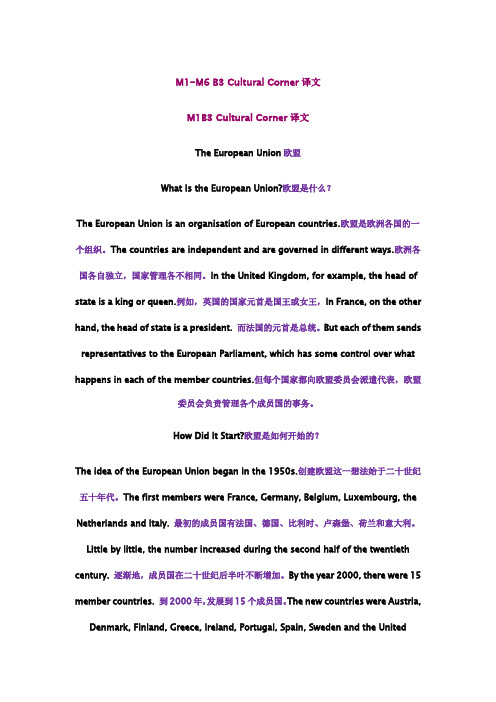
M1-M6 B3 Cultural Corner译文M1B3 Cultural Corner译文The European Union欧盟What Is the European Union?欧盟是什么?The European Union is an organisation of European countries.欧盟是欧洲各国的一个组织。
The countries are independent and are governed in different ways.欧洲各国各自独立,国家管理各不相同。
In the United Kingdom, for example, the head of state is a king or queen.例如,英国的国家元首是国王或女王,In France, on the other hand, the head of state is a president. 而法国的元首是总统。
But each of them sends representatives to the European Parliament, which has some control over what happens in each of the member countries.但每个国家都向欧盟委员会派遣代表,欧盟委员会负责管理各个成员国的事务。
How Did It Start?欧盟是如何开始的?The idea of the European Union began in the 1950s.创建欧盟这一想法始于二十世纪五十年代。
The first members were France, Germany, Belgium, Luxembourg, the Netherlands and Italy. 最初的成员国有法国、德国、比利时、卢森堡、荷兰和意大利。
Little by little, the number increased during the second half of the twentieth century. 逐渐地,成员国在二十世纪后半叶不断增加。
模块3第1到3单元课文翻译兼句子解析
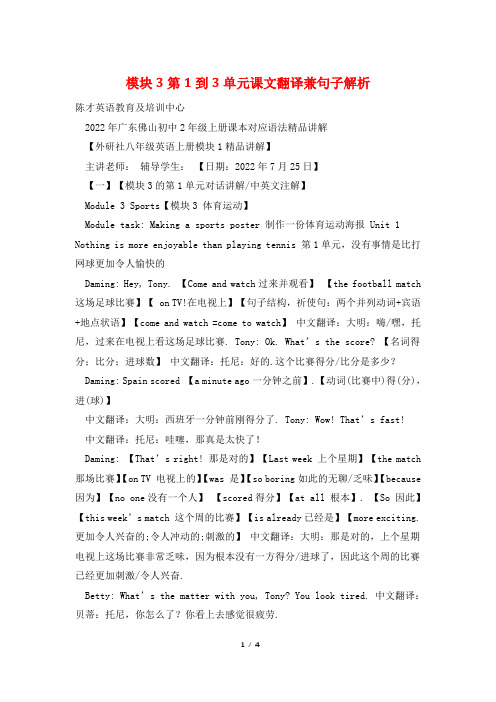
模块3第1到3单元课文翻译兼句子解析陈才英语教育及培训中心2022年广东佛山初中2年级上册课本对应语法精品讲解【外研社八年级英语上册模块1精品讲解】主讲老师:辅导学生:【日期:2022年7月25日】【一】【模块3的第1单元对话讲解/中英文注解】Module 3 Sports【模块3 体育运动】Module task: Making a sports poster 制作一份体育运动海报 Unit 1 Nothing is more enjoyable than playing tennis 第1单元,没有事情是比打网球更加令人愉快的Daming: Hey, Tony. 【Come and watch过来并观看】【the football match 这场足球比赛】【 on TV!在电视上】【句子结构,祈使句:两个并列动词+宾语+地点状语】【come and watch =come to watch】中文翻译:大明:嗨/嘿,托尼,过来在电视上看这场足球比赛. Tony: Ok. What’s the score? 【名词得分;比分;进球数】中文翻译:托尼:好的.这个比赛得分/比分是多少?Daming: Spain scored 【a minute ago一分钟之前】.【动词(比赛中)得(分),进(球)】中文翻译:大明:西班牙一分钟前刚得分了. Tony: Wow! That’s fast! 中文翻译:托尼:哇噻,那真是太快了!Daming: 【That’s right! 那是对的】【Last week 上个星期】【the match 那场比赛】【on TV 电视上的】【was 是】【so boring如此的无聊/乏味】【because 因为】【no one没有一个人】【scored得分】【at all 根本】. 【So 因此】【this week’s match 这个周的比赛】【is already已经是】【more exciting. 更加令人兴奋的;令人冲动的;刺激的】中文翻译:大明:那是对的,上个星期电视上这场比赛非常乏味,因为根本没有一方得分/进球了,因此这个周的比赛已经更加刺激/令人兴奋.Betty: What’s the matter with you, Tony? You look tired. 中文翻译:贝蒂:托尼,你怎么了?你看上去感觉很疲劳.Tony: I’m really tired after last night’s tennis match. And I hurt my knee. 中文翻译:托尼:昨天晚上看完网球比赛后我感觉非常累,我伤到了我的膝盖.Daming: That’s too bad! Sit down and watch the match. It’s safer than playing tennis.中文翻译:大明:那真太槽糕了,坐下来观看这场比赛,这/它比打网球更加平安.Betty: Yes, watching is not dangerous and it’s more relaxing too! 中文翻译:贝蒂:是的,观看不危险,并且它也是更加令人放松. Tony: Well, I’m not sure about that. Nothing is more enjoyable than playing tennis. 中文翻译:托尼,好吧,我不确信是那样,没有事情是比打网球更加令人愉快的.Betty: But you enjoyed watching the Olympics on TV, right?中文翻译:贝蒂:但是你喜欢在电视上观看奥林匹克运动会,对吗? Tony: Yes, but that’s because it was cheaper than buying tickets for all the games. 中文翻译:托尼:是的,但是那是因为在电视上观看要比购置所有的比赛的门票更加廉价.Daming: And staying at home was easier than going to the stadium. Oh, look at that!中文翻译:大明:而且呆在家里要比去体育馆更加容易,哦,看那个. Tony: Oh, he missed! Oh, bad luck!中文翻译:托尼:哦,他错过了这次进球,哦,真是坏运气! Daming: Never mind. There’s still plenty of time for them to score. 中文翻译:大明:没有关系/不要紧,他们仍然还有大量/充分得分/进球的时间.Unit 2 This year we are training more carefully. 第2单元,今年我们正更加仔细的训练.①It is Saturday tomorrow, but I am going to school. I am not going for lessons, but to play football. ②I am in our school team and we are going to play against another school next week. ③The practice starts at 10 am.④We all arrive as early as we can so that we have time to warm up. ⑤We are training harder than usual because theother team beat us last year. ⑥This year we want to do better. 中文翻译:明天是星期六,但是我还是要上学,我不是为了上课,而是为了踢足球,我在我们学校队,下个星期我们将要和另外学校进行比赛,这个训练将在上午10点开始,我们都要尽早地到达以便于我们有进行热身运动的时间,我们要比平时训练更加努力/刻苦,因为其他队去年战胜了/打败了我们,今天我们想做的更好点.⑦ It is more difficult to practice in winter because the days are short and the weather is cold too. ⑧It gets dark earlier, so it is important not to be late for after-school practice.中文翻译:在冬天训练更加困难了,因为白天短了,天气也很寒冷,而且天黑得更早了,因此课外训练不要迟到是很重要的our coach is pleased because we are playing better as a team now. Last year we were sometimes careless when we passed the ball and we lost to the other team in the final match. What a pity! This year we are training more carefully. That means we have a better chance of winning. 中文翻译:因为我们现在作为一个球队打的更好些,因此我们的教练对此感到很满意,去年,当我们在传递球的时候我们有时候非常粗心,并在最后决赛的时候输给了其他队,多么可惜啊!今天我们训练更加仔细,那意味着我们有一个更大获胜的时机.The fan club has fewer people this year. We hope to play well so that we have more fans to watch the matches. It is good to have our fans around. They cheer us on loudly and we feel more confident to win thegame.中文翻译:今年足球迷俱乐部的人数更少了,我们希望打得好一点以便于我们有更多足球迷来观看这些比赛,到处拥有足球迷是有好处的,他们大声地为我们呐喊/欢呼/助威,我们会更有信心去赢得这场比赛.重点,难点句子讲解【1】It is Saturday tomorrow, but I am going to school. I am not going for lessons, but to play football.该句子为一个省略句:省略了【主语+谓语】局部为:全句子应该为but( I am going) to play football=但是我将要踢足球.① It is Saturday tomorrow.【主语+系动词+表语+时间状语】句子语法结构如下:主语:It〔指代时间〕系动词:is 〔是〕表语:Saturday〔星期六〕时间状语:tomorrow(明天) 时态:一般现在时态句子中文意思:明天是星期六.② but I am going to school. 【连词+主语+谓语+状语】句子语法结构如下:连词:but (但是) 主语:I〔我〕。
英语模块三
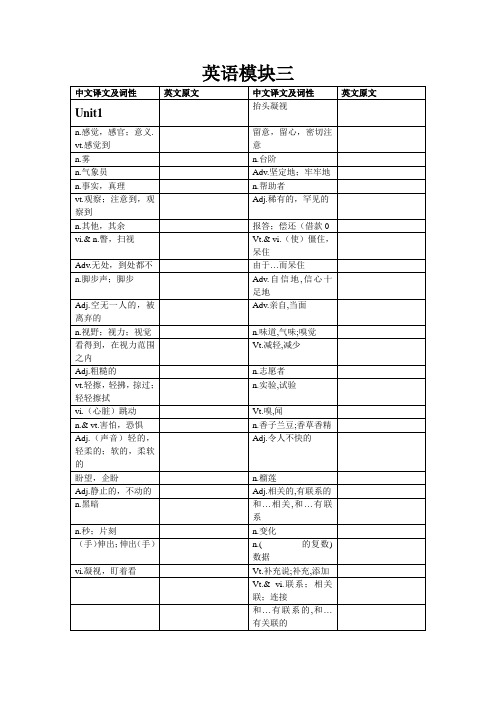
Prep.在…各处,遍及
vt.反映,反射
n.马来语;马来人
n.囚犯
Adj.马来语的;马来人的
n.符号;象征
Adj.泰米尔语的;人泰米尔语
n.泰米尔语,泰米尔人
n.相反的事物,相对立的事物
中文译文及词性
英文原文
中文译文及词性
英文原文
vt.显示,表示;象征,暗示
n.遗迹,遗址;残留物
n.距离
n.& vt.移植
n.珠宝
Adv.临时地,暂时地
Adj.发亮的,光亮的
vt.空运
vt.避开;避免
n.治疗;处理,对待
水上运动
Adv.有希望的
n.建议
中文译文及词性
英文原文
中文译文及词性
英文原文
n.& vi.惊慌,恐慌
n.发展,开发
vt.将…///刺入
n.诺曼人
Adj.诺曼的;诺曼人的
n.闪电
n.市民
Adj.瑞典的;瑞典人的,瑞典语的
n.瑞典人;瑞典语
Adj.主要的
n.(常作-----)废墟,遗址
Adj.军事的;武装的
中文译文及词性
英文原文
中文译文及词性
英文原文
实施,执行,进行
n.相似点;相似,类似
n.机场
Adv.同样地
n.炸弹
vt.轰炸
n.路线,线路
vi.爆炸
n.贸易,交易
n.甲板,木板
n.耳语
Adj.日常的;每天的
vi.碰撞;发出砰的响声
n.电视
(不小心)撞着某物
n.触觉;接触
Vt.触摸;接触
n.类型;型号
- 1、下载文档前请自行甄别文档内容的完整性,平台不提供额外的编辑、内容补充、找答案等附加服务。
- 2、"仅部分预览"的文档,不可在线预览部分如存在完整性等问题,可反馈申请退款(可完整预览的文档不适用该条件!)。
- 3、如文档侵犯您的权益,请联系客服反馈,我们会尽快为您处理(人工客服工作时间:9:00-18:30)。
陈才英语教育及培训中心2014年广东佛山初中2年级上册课本对应语法精品讲解【外研社八年级英语上册模块1精品讲解】主讲老师:辅导学生:【日期:2014年7月25日】【一】【模块3的第1单元对话讲解/中英文注解】Module 3 Sports【模块3 体育运动】Module task: Making a sports poster 制作一份体育运动海报Unit 1 Nothing is more enjoyable than playing tennis第1单元,没有事情是比打网球更加令人愉快的Daming: Hey, Tony. 【Come and watch过来并观看】【the football match这场足球比赛】【on TV!在电视上】【句子结构,祈使句:两个并列动词+宾语+地点状语】【come and watch =come to watch】中文翻译:大明:嗨/嘿,托尼,过来在电视上看这场足球比赛. Tony: Ok. What’s the score?【名词得分;比分;进球数】中文翻译:托尼:好的.这个比赛得分/比分是多少?Daming: Spain scored 【a minute ago一分钟之前】.【动词(比赛中)得(分),进(球)】中文翻译:大明:西班牙一分钟前刚得分了.Tony: Wo w! That’s fast!中文翻译:托尼:哇噻,那真是太快了!Daming: 【That’s right!那是对的】【Last week 上个星期】【the match 那场比赛】【on TV 电视上的】【was 是】【so boring如此的无聊/乏味】【because 因为】【no one没有一个人】【scored得分】【at all 根本】. 【So 因此】【this week’s match这个周的比赛】【is already 已经是】【more exciting.更加令人兴奋的;令人激动的;刺激的】中文翻译:大明:那是对的,上个星期电视上这场比赛非常乏味,因为根本没有一方得分/进球了,因此这个周的比赛已经更加刺激/令人兴奋.Betty: What’s the matter with you, Tony? You look tired.中文翻译:贝蒂:托尼,你怎么了?你看上去感觉很疲劳.Tony: I’m really tired after last night’s tennis match. And I hurt my knee.中文翻译:托尼:昨天晚上看完网球比赛后我感觉非常累,我伤到了我的膝盖.Daming: That’s too bad! Sit down and watch the match. It’s safer than playing tennis.中文翻译:大明:那真太槽糕了,坐下来观看这场比赛,这/它比打网球更加安全.Betty: Yes, watching is not dangerous and it’s more relaxing too!中文翻译:贝蒂:是的,观看不危险,并且它也是更加令人放松. Tony: Well, I’m not sur e about that. Nothing is more enjoyable than playing tennis.中文翻译:托尼,好吧,我不确信是那样,没有事情是比打网球更加令人愉快的.Betty: But you enjoyed watching the Olympics on TV, right?中文翻译:贝蒂:但是你喜欢在电视上观看奥林匹克运动会,对吗?Tony: Yes, but that’s because it was cheaper than buying tickets for all the games.中文翻译:托尼:是的,但是那是因为在电视上观看要比购买所有的比赛的门票更加便宜.Daming: And staying at home was easier than going to the stadium. Oh, look at that!中文翻译:大明:而且呆在家里要比去体育馆更加容易,哦,看那个. Tony: Oh, he missed! Oh, bad luck!中文翻译:托尼:哦,他错过了这次进球,哦,真是坏运气!Daming: Never mind. There’s still plenty of time for them to score.中文翻译:大明:没有关系/不要紧,他们仍然还有大量/充分得分/进球的时间.Unit 2 This year we are training more carefully.第2单元,今年我们正更加仔细的训练.①It is Saturday tomorrow, but I am going to school. I am not going for lessons, but to play football.②I am in our school team and we are going to play against another school next week.③The practice starts at 10 am.④We all arrive as early as we can so that we have time to warm up.⑤We are training harder than usual because theother team beat us last year.⑥This year we want to do better.中文翻译:明天是星期六,但是我还是要上学,我不是为了上课,而是为了踢足球,我在我们学校队,下个星期我们将要和另外学校进行比赛,这个训练将在上午10点开始,我们都要尽早地达到以便于我们有进行热身运动的时间,我们要比平时训练更加努力/刻苦,因为其他队去年战胜了/打败了我们,今天我们想做的更好点.⑦It is more difficult to practice in winter because the days are short and the weather is cold too.⑧It gets dark earlier, so it is important not to be late for after-school practice.中文翻译:在冬天训练更加困难了,因为白天短了,天气也很寒冷,而且天黑得更早了,因此课外训练不要迟到是很重要的our coach is pleased because we are playing better as a team now. Last year we were sometimes careless when we passed the ball and we lost to the other team in the final match. What a pity! This year we are training more carefully. That means we have a better chance of winning.中文翻译:因为我们现在作为一个球队打的更好些,因此我们的教练对此感到很满意,去年,当我们在传递球的时候我们有时候非常粗心,并在最后决赛的时候输给了其他队,多么可惜啊!今天我们训练更加仔细,那意味着我们有一个更大获胜的机会.The fan club has fewer people this year. We hope to play well so that we have more fans to watch the matches. It is good to have our fans around. They cheer us on loudly and we feel more confident to win thegame.中文翻译:今年足球迷俱乐部的人数更少了,我们希望打得好一点以便于我们有更多足球迷来观看这些比赛,到处拥有足球迷是有好处的,他们大声地为我们呐喊/欢呼/助威,我们会更有信心去赢得这场比赛.重点,难点句子讲解【1】It is Saturday tomorrow, but I am going to school. I am not going for lessons, but to play football.该句子为一个省略句:省略了【主语+谓语】部分为:全句子应该为but( I am going) to play football=但是我将要踢足球.①It is Saturday tomorrow.【主语+系动词+表语+时间状语】句子语法结构如下:主语:It(指代时间)系动词:is (是)表语:Saturday(星期六)时间状语:tomorrow(明天)时态:一般现在时态句子中文意思:明天是星期六.②but I am going to school. 【连词+主语+谓语+状语】句子语法结构如下:连词:but (但是)主语:I(我)谓语:am going(将要去)状语:to school(学校)时态:现在进行时态句子中文意思:但是我将要去学校.③I am not going for lessons, but to play football.并列分句⑴:I am not going for lessons转折连词:but并列分词⑵:but (I am going省略了) to play football 并列分句⑴结构:【主语+谓语+状语】并列分句⑴句子语法结构如下:主语:I(我)谓语:not am going(将要去)状语:for lessons(上课)句子时态:现在进行时态句子意思:我将不是去上课.并列分句⑵结构:【主语+谓语+状语】并列分句⑵句子语法结构如下:转折连词:but(但是)主语:I(我)(省略)谓语:am going(将要去)(省略)状语:to play football(去踢球)句子时态:一般将来时态句子中文意思:而是我将要去踢足球.【二】I am in our school team and we are going to play against another school next week.【该句为一个并列句】句子语法结构如下:【简单句⑴+并列连词+简单句⑵】简单句⑴【主语+系动词+表语】主语:I (我)系动词:am(是)表语:in our school team(在我们学校队)时态:一般现在时态句子意思:我在我们学校足球队.简单句⑵【主语+谓语+目的状语】主语:we (我们)谓语: are going(将要)目的状语:to play against another school(与另外一所学校进行比赛)时间状语:next week.(下个周)【短语动词play against与... 比赛】时态:一般将来时态句子意思:我们将在下个周与另外一所学校进行足球比赛.【三】T he practice starts at 10 am.句子结构:【主语+谓语+状语】句子语法结构如下:主语:The practice (这个训练)谓语: starts(将开始)时间状语:at 10 am(在上午10点钟)句子时态:一般现在时态句子中文意思:这个训练将在上午10点钟开始.【四】We all arrive as early as we can so that we have time to warm up.【复合句】复合句结构:主句⑴+从属连词+从句⑵主句⑴:We all arrive as early as we can(arrive)从属连词:so that(以便于)从句⑵we have time to warm up.(我们有做准备活动的时间)从句⑴结构:【主语+同位语+谓语+状语】主句⑴句子语法结构如下:主语:We (我们)同位语: all(都)谓语: arrive(抵达,到达)状语:as early as we can(我们尽可能早地到达)句子时态:一般现在时态中文翻译:我们都将尽可能早地到达.从属连词:so that(以便于)从句⑵we have time to warm up.从句⑵结构:【连词+主语+谓语+宾语+定语】主句⑵句子语法结构如下:主语:We(我们)谓语:have(有)宾语:time(时间)后置定语:to warm up(做准备活动,热身运动)句子时态:一般现在时态句子中文意思:我们有做热身运动(准备活动)的时间.整个复合句的意思:我们都尽可能早地到达以便于我们有做热身运动(准备活动)的时间.【五】We are training harder than usual because the other team beat us last year.句子结构:主句⑴+连词+从句⑵从句⑴结构:【主语+谓语+状语】主句⑴语法结构如下:主语:We (我们)谓语:are training (训练)比较状语:harder than usual(比平常更加努力/刻苦)句子时态:现在进行时态(属于阶段进行时态)句子中文意思:我们要比平常训练更刻苦/努力.从句⑵结构:【连词+主语+谓语+宾语+状语】主句⑵语法结构如下:从属连词:because(因为)主语:the other team(其它队)谓语:beat(打败,击败战胜)宾语:us (我们)时间状语:last year(去年)句子时态:一般过去时态中文翻译:因为去年其它队打败(战胜)了我们.【六】This year we want to do better.句子结构为:【主语+谓语+宾语】句子语法结构如下:时间状语: this year (今年)主语:We (我们)谓语: wants(想)宾语:to do better (做的更好点)时态:一般现在时态句子中文意思:今天我们想做的更好点.【七】It is more difficult to practice in winter because the days are short and the weather is cold too.句子结构:主句⑴+连词+从句⑵从句⑴结构:【主语+系动词+表语】主句⑴语法结构如下:主语:It (它)系动词:is(是)表语:more difficult(更加困难)句子真正主语:to practise in winter( 在冬天训练)句子时态:一般现在时态句子中文意思:在冬天训练是更加困难的从句⑵结构:【连词+主语+系动词+表语】主句⑵语法结构如下:从属连词:because(因为)并列分句⑴语法结构主语:the days(白天)系动词:are(是)表语: short(短的)句子时态:一般现在时态中文翻译:因为白天变短了.并列分句⑵语法结构主语:the weather(白天)系动词:is(是)表语: cold(寒冷的)句子时态:一般现在时态中文翻译:天气也很寒冷从句完整翻译:因为白天变短了并且天气很寒冷了.【八】It gets dark earlier, so it is important not to be late for after-school practice.句子结构:(表原因)并列句⑴+连词并列句⑵并列句⑴语法结构【主语+系动词+表语+状语】主语:It(它)系动词:gets(变得)表语:dark(黑暗)状语:earlier(更早地)时态:一般现在时态句子中文意思:天更早就变黑了.并列句⑵语法结构【主语+系动词+表语+状语】形式主语:It (它)系动词:is(是)表语:important(重要的)正真主语:not to be late for after-school practice(课后训练不迟到)时态:一般现在时态句子中文意思:课后训练不迟到是很重要的.【九】our coach is pleased because we are playing better as a team now. 句子结构:主句⑴+连词+从句⑵从句⑴结构:【主语+系动词+表语】主句⑴语法结构如下:主语:Our coach (我们的教练)系动词:is(是)表语:pleased(满意的,高兴的)句子时态:一般现在时态句子中文意思:我们的教练很满意.从句⑵结构:【连词+主语+系动词+表语】主句⑵语法结构如下:从属连词:because(因为)主语:We(我们)谓语:are playing(踢得)状语: better(更好地)状语:as a team (作为一个足球队)状语:now(现在)句子时态:一般现在时态中文翻译:因为我们现在作为一个足球队踢得更好了.完整中文翻译:因为我们现在作为一个足球队踢得更好了.所以我们教练很满意/很高兴.【十】Last year we were sometimes careless when we passed the ball and we lost to the other team in the final match.句子结构:主句⑴+连词+从句⑵主句⑴的结构:【主语+系动词+状语+表语】主句⑴并列举分句⑴的语法结构主语:We(我们)系动词:were(是)状语:sometimes(有时候)表语:careless (粗心的,疏忽的)时态:一般现在时态句子中文意思:我们有时候很粗心.主句⑴并列分句⑵的语法结构【并列连词+主语+谓语+宾语】连词:and (并,然后)主语:we(我们)谓语: lost to (输给)宾语:the other team (其它队)状语:in the final match. (在决赛中)从句⑵结构:【主语+谓语+宾语】从句⑵语法结构如下:时间状语:last year (去年)引导时间状语从属连词:when(当….的时候)主语:we (我们)谓语:passed (传递)宾语:the ball(球)句子时态:一般现在时态句子中文意思:去年当我们在传递球的时候.整个复合句中文意思:去年当我们在传递球的时候.我们有时候很粗心,并输给了其它球队.【十一】What a pity!句子种类感叹句句子结构:what + 冠词+名词(主语)+(谓语)What a pity (it is) !句子时态:一般现在时态句子中文意思:多么可惜啊!多么遗憾啊!【十二】This year we are training more carefully.句子种类:肯定陈述句句子结构:时间状语+主语+谓语+状语句子语法结构:时间状语:this year(今年)主语:we(我们)谓语:are training(训练)状语:more carefully(更加仔细地)时态:现在进行时态(属于阶段进行时态)句子中文意思:今年,我们要更加仔细训练.【十三】That means we have a better chance of winning.句子种类:肯定陈述句句子结构:主语+谓语+宾语从句主句的语法结构:主句主语:That (那)主句谓语:means(意味着)主句宾语:we have a better chance of winning(我们有一个更大的获胜机会)宾语从句的语法结构:主语:We(我们)谓语:have(有)宾语:a better chance(一个更大的机会)后置定语:of winning(获胜的)时态:一般现在时态句子中文意思:那意味着我们拥有一个更大的获胜的机会.【十四】The fan club has fewer people this year.句子种类:肯定陈述句句子结构:主语+谓语+宾语+时间状语句子的语法结构:主语:The fan club(球迷俱乐部)谓语:has (有)宾语:fewer people(更少的人)时间状语:this year(今年)时态:一般现在时态句子中文意思:球迷俱乐部今年人数更少了.【十五】We hope to play well so that we have more fans to watch the matches.句子结构:主语+谓语+连词+目的状语从句句子的语法结构:主语:We (我们)谓语:hope(希望)宾语:to play(踢球)状语:well(好地,很好地)时态:以便现在时态:句子中文意思:我们希望踢好点.目的状语从句so that we have more fans to watch the matches.连词:so that (以便于)从句主语:we (我们)从句谓语:have(有)从句宾语:more fans(更多球迷)从句定语:to watch the matches(观看这些比赛)时态:一般现在时态句子中文意思:以便我们有更多球迷观看这些比赛.【十六】It is good to have our fans around. 【动词不定式作句子主语】句子种类:肯定陈述句句子结构:主语+系动词+表语句子的语法结构:形式主语:It(它)系动词:is (是)表语:good(有好处的,有益处的)真正主语:to have our fans(拥有我们的球迷)状语:around(到处,四周,周围)【十七】They cheer us on loudly and we feel more confident to winthe game.句子种类:肯定陈述句句子结构:并列分句⑴+ 连词(and)+并列分句⑵并列分句⑴的语法结构:主语:They(他们)谓语:cheer on(为…欢呼,喝彩,加油)宾语:us(我们)状语:loudly(大声地)时态:一般现在时态:句子中文意思:他们为我们大声地欢呼.并列分句⑵连词:and(然后,而且,并)主语:we(我们)系动词:feel(感觉;觉得)表语:more confident(更加有信心)状语:to win the game (去赢得这场比赛)时态:一般现在时态句子中文意思:我们感觉更加有信心去赢得这场比赛.。
